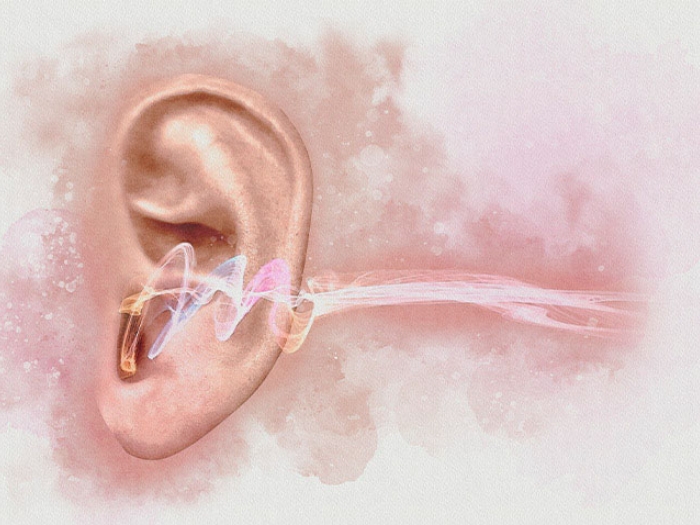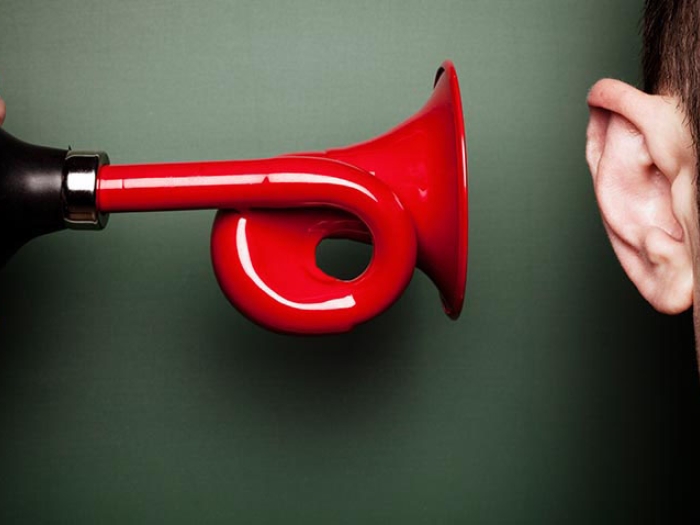An audiologist’s advice on how best to avoid preventable hearing loss.
5:00 AM
Author |

The World Health Organization recently announced a new awareness theme around hearing damage: "To hear for life, listen with care."
The theme's primary focus is on emphasizing the importance of hearing loss prevention, which is done through safe listening. Safe listening consists of actively ensuring that sound-related activities and environments do not cause damage to one's hearing.
Allie Jo Heckman, Au.D., is a clinical audiologist in the adult audiology division of Michigan Medicine's Department of Otolaryngology. Here, Heckman speaks about her role as a hearing expert and offers advice on how to best prevent hearing loss while protecting your ears.
Describe your role as an audiologist.
Heckman: A doctor of audiology diagnoses and manages hearing and balance disorders.
I specialize in diagnostics, aural rehabilitation and tinnitus management. This involves the diagnosis and management of hearing loss and tinnitus, or ringing in the ears. I often work with hearing aids and other listening devices to ensure that our patients can communicate at the best of their abilities.
How do you assess hearing loss in your patients?
Heckman: To determine the type and degree of hearing loss, audiologists complete testing to assess sound detection and speech testing. This test results in a graph called an audiogram. The audiogram tells us if the patient has adequate access to speech sounds, as well as how clearly they understand speech.
A thorough case history is completed on each patient to learn more about how they perceive their own hearing problem, as well as their risk factors for hearing loss and other problems they may experience, like tinnitus and/or dizziness.
However, an audiologist's scope of practice goes beyond diagnostic testing. Audiologists are key team members in creating individualized care plans for their patients. These plans are designed to help them achieve their communication goals, while preventing further ear damage.
What types of trends have you noticed when it comes to hearing loss?
Heckman: Traditionally, the incidence and prevalence of hearing loss increases with age. But what is so concerning to us as audiologists is that many people are experiencing hearing loss at younger ages.
Research shows that up to 20% of adults have preventable hearing loss from sound exposure in the 20 to 70-year-old age range. Approximately 15% of 11 to 19-year-olds have noise-induced hearing loss in one or both ears. Hearing loss caused by excessive sound exposure is the only form of preventable hearing loss.
That's why the WHO's new theme is so important; it revolves around the fact that good hearing is extremely vital to communicating. Hearing loss can cause increased listening effort for daily interaction. This extra work to listen can make an individual physically tired at the end of the day, while adding stress to their everyday conversations.
What do you recommend to prevent hearing loss related to sound exposure?
Heckman: Community education related to hearing wellness is lacking. Audiologists are constantly working to better educate the public about what they can do to preserve their hearing. In addition, it's important to share information about what individuals should do if they are having a hearing problem. The overall awareness surrounding the dangers of extreme sound exposure is relatively low. And many people don't realize how loud their environments can really be.
Our cumulative sound exposures contribute to our daily "dose" of sound. Regular sound exposures from loud exercise classes, sporting events or playing musical instruments, all add up over time. This can result in a permanent change in hearing.
Many people are unaware that it only takes one occurrence, like a concert or the loud discharging of a gun, without proper hearing protection, to permanently inflict change on their hearing.
Noise induced hearing loss can be prevented by being aware of the damaging sound levels and wearing earplugs when exposure to loud sound is unavoidable. A person should reduce the time duration of their sound exposure when it is possible. Walking away from loud noises and/or taking action to physically reduce extreme levels of sound are both options when it comes to protecting our hearing. For many people, the simple action of reducing the volume level of their headphones can be very helpful.
Since the pandemic began, many individuals are not exposed to sound in the way they may have been in the past. But spending more time at home, as well as remote working and virtual learning, has increased our use of personal listening devices and loud sound exposures from headphones.
Listening to headphones at full volume (i.e. 100 decibels or more) is only safe for about 10 minutes. It's alarming to think about how easy it is for damage to our hearing to occur from this simple act alone. And parents of young children may be unaware of the loudness of their children's headphone volume. Many adults are also unaware that they may be frequently listening to sound in their headphones at unsafe levels.
At our hearing clinic, we've recently seen an uptick in temporary hearing loss, tinnitus and sound sensitivity in our patients related to sound exposures. While some of these conditions may be temporary, some may deal with a permanent change in hearing status.
An audiologist can assess a person's ear concerns, make the necessary referrals to other specialties, make recommendations for hearing protection and help manage hearing problems through hearing technology options.
To learn more about sound exposure and hearing loss, the National Institute of Deafness and Other Communication Disorders has great hearing wellness information.
To schedule an appointment for treatment of hearing loss, call Michigan Medicine's audiology team at 734-936-8051. Insurance benefits may be used for comprehensive evaluations. Most insurances will require an order from a referring physician for this type of testing.
Like Podcasts? Add the Michigan Medicine News Break on iTunes, Google Podcasts or anywhere you listen to podcasts.

Explore a variety of health care news & stories by visiting the Health Lab home page for more articles.

Department of Communication at Michigan Medicine
Want top health & research news weekly? Sign up for Health Lab’s newsletters today!





